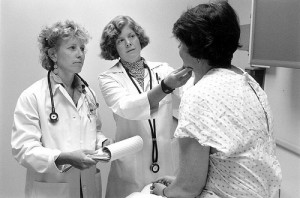 The Importance of OBGYN Specialists and Women’s Health
The Importance of OBGYN Specialists and Women’s Health
Men and women will always differ in shape, weight, height, and anatomy. Both will experience their own range of physical, emotional and health problems as they relate to the specific sex. They have different problems, with different needs.
It’s why at some point in time, men will look towards finding a qualified urologist or male specific physician they can trust, and why women in the Plano, Frisco and Dallas, Texas area will look towards finding a resourceful women’s health center, such as Women’s Specialists of Plano, or OBGYN specialist (doctor for a female who specializes in the health needs of women) so that the problems and needs specific to the male or female body can be addressed.
While heart disease, cancer, weight management, the risk for diabetes, and many other ailments are common concerns for both men and women, there are specific conditions related to the female anatomy that a man will never experience. It’s the reason why annual visits to an OBGYN specialists are so crucial to the long-term health of a woman.
According to Women’s Specialists of Plano, a women’s health center in Plano, Texas, there are a handful of common problems that women will experience that a man never will. These conditions and reasons to visit a doctor for a female, specifically, are why millions of young women begin seeing a gynecologist at a relatively early age.
- PMS
When a woman is on her menstrual cycle, PMS can kick in and for some, it is bad enough that all normal activities will come to a halt. The symptoms of PMS can range from mild to severe and will include (for most women) cramping, bloating, mood swings, headaches and fatigue. Experts believe that hormones play the biggest factor in the severity of symptoms associated with PMS. Once a woman is under the routine care of a gynecologist, these symptoms can often be treated and managed each month.
- Endometriosis
Endometriosis is somewhat common among women. It is a female health disorder that occurs when the cells that typically reside in the lining of the uterus, grow in other parts of the body. The most common symptoms are very heavy bleeding and cramping, irregular periods, long-lasting menstrual cycles, and problems getting pregnant (infertility). Many gynecologists offer specialized treatment for endometriosis such as endometrial ablation, hysterectomy, and other minimally invasive techniques.
- Ovarian Cysts
Ovarian cysts are very common among the female population. These are small, fluid-like sacs that develop and grow in the uterus. Many women may have these benign growths and not experience any symptoms, while other women may have problems associated with ovarian cysts such as bleeding, cramping, and rupture. Gynecologists treat ovarian cysts as a routine procedure and today, many progressive treatments are an option including laparoscopic surgery, and robotic surgery for hysterectomy.
- HPV Virus
Genital human papillomavirus is notably the most common sexually transmitted infection among young women. There are varying types of HPV that can lead to a myriad of symptoms including pelvic pain, genital warts, and other conditions that can lead to larger problems such as cervical cancer. HPV can be prevented and it is a topic of discussion among gynecologists and their female patients. These conversations generally involve the discussion of prevention and treatment.
- Vaginal Infections
Bacteria and fungi are the culprits that lead to vaginal infections among women. It is one of the most common reasons why a woman will visit her gynecologist outside of her annual visit. Discharge, itching, vaginal burning and irritation are the symptoms associated with a vaginal infection. Antibiotics can usually cure most vaginal infections effectively. A gynecologist will be able to discuss prevention techniques to help keep future infections at bay.
- Pregnancy Prevention
Something that will surely differentiate a man and a woman until the end of time is pregnancy. Millions of women in the United States visit their gynecologist each and every year to discuss pregnancy prevention, birth control, and pre-natal care for if and when a pregnancy occurs. It is a topic of discussion at most OBGYN visits until a woman has had all of her children and begins the next phase of life (menopause). A gynecologist is the best resource to discuss pregnancy and pregnancy prevention with a woman.
- Hysterectomy
Thousands of women will undergo a hysterectomy in a given year. A gynecologist may recommend a hysterectomy for many reasons, including for the treatment of fibroid tumors, PID, ovarian cysts, and endometriosis. Today’s technology has allowed skilled gynecologists to do hysterectomies robotically which leads to quicker recovery and a decrease in unwanted side effects. Robotic hysterectomies are not yet offered by all gynecologists as it takes extensive training and time to be able to master the technology; it is becoming more popular and a preferred choice among women.
Every city and state has a women’s health center that can offer a doctor for a female’s medical needs. Sometimes referred to as a women’s health physician, gynecologist, or OBGYN specialist, they all meet the same challenge—keeping a female healthy both physically and in some case, emotionally. It’s important to see your doctor annually and sometimes more often if problems or an untreated condition persists.
If you would like to schedule an appointment with an OBGYN specialist to discuss your women’s health concerns, please contact the Plano, Frisco and Dallas, Texas area office of Women’s Specialists of Plano.
